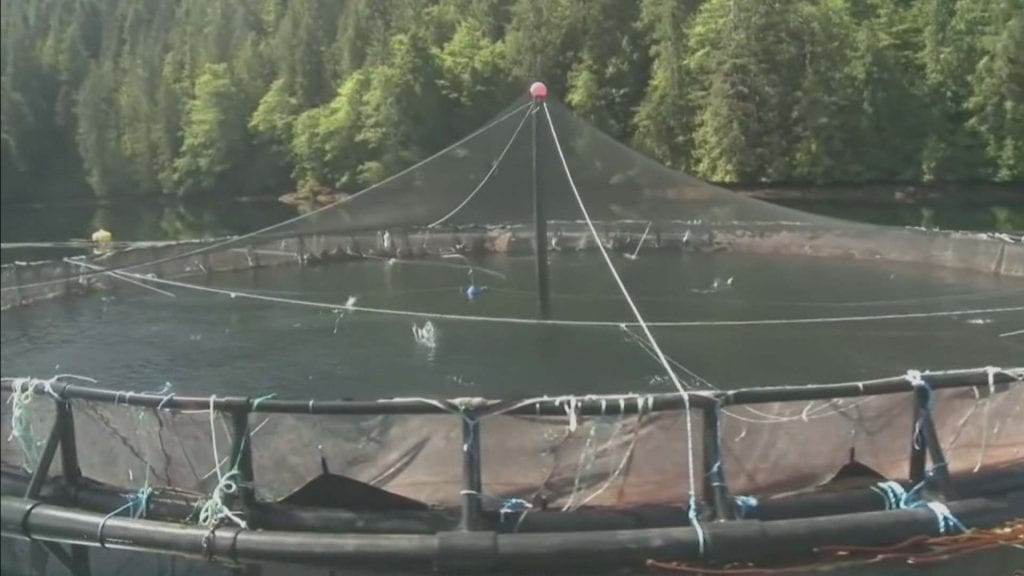
Fish farms on the coast are being blamed for the decline in Fraser River salmon. Submitted photo.
A First Nation in British Columbia says it has lost faith in federal plans to remove open net-pens from the province’s ocean salmon farms and is reluctantly relaunching legal action it had on hold that challenges Fisheries Department aquaculture policy.
The court route is a last resort, but the Namgis First Nation on northern Vancouver Island must take on the Fisheries Department to protect wild salmon off B.C.’s coast, Chief Victor Isaac said Wednesday.
The First Nation has served notice to the fisheries minister that it will reactivate a 2019 judicial review application over Fisheries Department policy against testing for a salmon virus before restocking open-net pens for farmed salmon, he said.
“We believe the only way to protect our rights and the wild salmon is to go back to court,” Isaac said at a news conference that included other Namgis council members and Indigenous leaders.
“When this 90-day notice expires on Aug. 13 we’ll be ready to fight to protect our rights,” he said. “We will again prove that DFO’s consultation with us was a sham.”
Namgis lawyer Sean Jones said the nation notified the Fisheries Department and other parties that it is resuming its 2019 litigation.
“That notice triggers a 90-day notice period or waiting period,” he said.
The court application was put on hold in 2021 following Prime Minister Justin Trudeau’s directive for the Fisheries Department to transition away from open net-pen salmon farms in B.C. by 2025, but Isaac said the nation is no longer optimistic that will happen.
In February 2023, former fisheries minister Joyce Murray announced the federal government would not renew licences for 15 open-net Atlantic salmon farms around B.C.’s Discovery Islands.
She cited recent science that indicated uncertainty over the risks posed by the farms to wild salmon, and said the government was committed to developing a responsible plan to transition away from open-net farming in coastal B.C. waters.
Murray’s mandate letter from Trudeau tasked her with developing the plan to shift from open-net salmon farming in B.C. by 2025, while working to introduce Canada’s first Aquaculture Act.
Current Fisheries Minister Diane Lebouthillier has a similar mandate letter from Trudeau.
The Fisheries Department has yet to release its expected final transition plan for 79 B.C. salmon farms.
The B.C. Salmon Farmers Association has said an economic analysis concluded the province could lose more than 4,700 jobs and up to $1.2 billion in economic activity annually if salmon farm licences are not renewed.
Jones said the First Nation’s judicial review application seeks to challenge the Fisheries Department’s policy not to test for the Piscine orthoreovirus, or PVR, before stocking open net-pen salmon farms in B.C.
“It’s the lawfulness of the risk assessment Namgis is challenging,” he said. “The court will review whether that assessment was reasonable.”
The Fisheries Department has conducted numerous studies on the effects of PRV on farmed Atlantic salmon and wild salmon, but found minimal risk to wild stocks.
The B.C. Salmon Farmers’ Association has said earlier archived salmon tissue from 1977 indicates PRV was present in B.C. waters before the establishment of fish farms.
The Fisheries Department was not immediately available for comment Wednesday, but said earlier that it supports new research to help identify and understand potential risks associated with the various strains of PRV.
Dan Svanvik, a hereditary chief and former Namgis First Nation elected chief, said the nation is going to court to protect wild salmon.
“We don’t really want to be back in court but we’ve learned the hard way that we have to fight to protect our fish and our rights,” he said.
“We see that DFO has no intention of removing the fish farms as mandated by the prime minister.”
Story by Dirk Meissner










